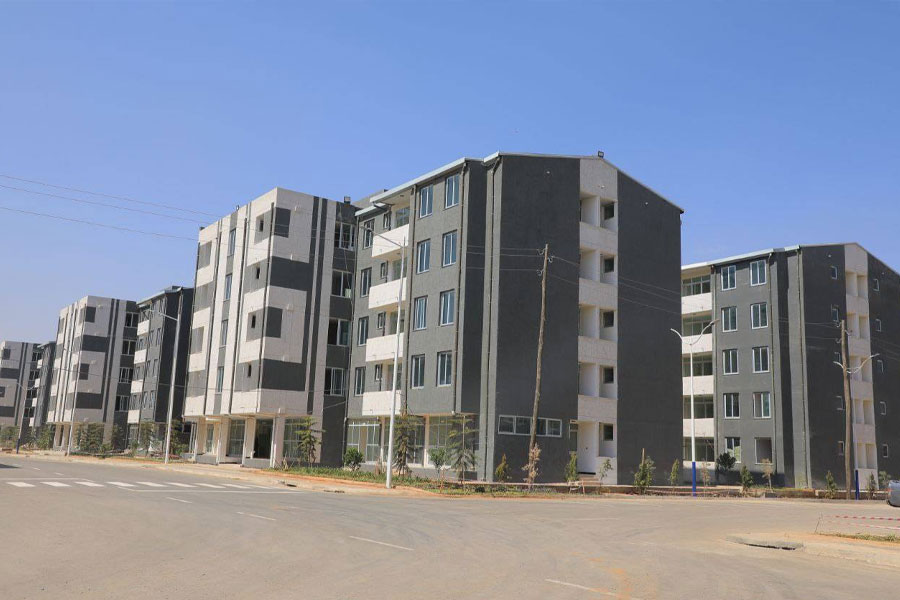
Fortune News | Nov 24,2024
Yididya Tesfaye hailed from Hawassa city, securing a job as a Chemistry teacher in one of the private schools of Addis Abeba two years ago. His salary is 8,000 Br, living in a one-room house near the CMC area, a walking distance from his workplace.
The teacher paid a monthly rent of 4,000 Br, with a threefold review of rent since he signed the agreement reaching 6,000 Br.
At the start of March, the homeowner has given him an eviction notice, reasoning that the house is up for sale. Yididya contemplates it is because he wants to rent the house to another person at a higher price.
He tried to look for a new house in the area that could accommodate him at a reasonable price. However, he could not find anything less than 9,000 Br.
"I don't know what to do," he said.
He fears that the environment would become inhabitable if he went to the Authorities and complained about his landlord.
"Putting a ban without a regulatory mechanism is a joke," Yididya told Fortune.
During the pandemic, the City Administration Cabinet decided to forbid increasing rental fees to alleviate the financial strain of the lockdown.
The embargo keeps getting extensions until now, citing several reasons, including controlling the market inflation and curbing the economic hurdles. It is further prolonged to the end of May at the Cabinet's latest meeting three weeks ago.
"It'll be lifted when the Cabinet believes the market has stabilised," said Bereket Takele, press secretary at the Mayor's Office.
The rising price of house rent in Addis Abeba has become unbearable for most residents taking a big portion of their income. The population estimate of the capital for the year 2022 was at 3.8 million people, a per capita of 263.15 Br projected to be 5.1 million by 2037.
Mayor Adanech Abiebie disclosed the City Administration plans to address the crisis by constructing 100,000 housing units for middle-class and public employees through a public-private partnership (PPP) scheme with 68 potential investors. She said the construction will begin in the next two months during the signing ceremony a couple of weeks ago.
As the main revenue source for the City Administration, Addis Abeba Revenue Bureau annually collects rental income taxes from owners through 116 woreda offices and 16 district branches, based on the agreement between the tenants and owners.
According to Wondmagegn Kassaye, tax assessment head at the Bureau, most owners withheld the actual rental fee leading officials to make their own market assessment to determine the tax.
The Bureau plans to collect rental income taxes from 182,971 taxpayers in the current fiscal year.
Its revenue has increased through the years, earning 3.17 billion Br last year, 2.576 billion Br the year before and 2.105 billion Br in 2020.
"The figure shows the ban didn't affect our performance," said Wondmagegn. He believes the amount has risen as the awareness level of taxpayers increased over the years.
Brokers disagree, attributing the increased return to the unrealistic tax rate imposed by the Bureau.
Admassu Abebe, a broker around the Gofa Mebrat Hayl area for six years, argues that increasing the tax rate on owners while banning them from adjusting to rental fees has its mark on the market price going up.
He explains landlords would claim to sell or renovate their house to evict tenants, raising the price on the next renter. He notes that an 18sqm studio condominium house at Gofa has shown over a 4,000 Br increase from where it was before the pandemic.
The broker claims to accumulate up to 200,000 Br from house sales before the pandemic. He moonshines as an electrician because it has become difficult to cover his usual expenses. For him, the on-and-off suspension of property transaction services has exacerbated the challenge.
He reasons the usually active market has quieted down even though there is housing demand, with tenants preferring to increase payments and dealing under the table with their landlords.
"Finding a new place would be more expensive," he told Fortune.
A number of factors determine the high market value.
Hemen Melese is a land and real property valuation department lecturer at Dire Dewa University. She did a research paper on the continued price appreciation of condominium housing in Addis Abeba.
Her research cites higher rates of housing supply, corruption, brokers' involvement, inflation, lack of flexible government control, and location differences as the factors influencing sales and rental prices.
According to Hemen, misinformation aired by brokers to increase the market price raises the tax rate. She suggests that the market be opened for agents who can act as evaluators and appraisers.
The City Administration keeps records of complaints made by landlords that have "enough reason" to vacate tenants from their properties while assigning Woredas to handle complaints coming from tenants.
Kirkos district woreda 09 registered two complaints from tenants that refused to vacate in the last six months. The wereda accommodates 10,000 residents, of which most are accommodated under 2,000 Kebele houses.
The Woreda administrator GebreKristos GebreEgziabher said most complaints stay buried without getting reported as owners may use other techniques that are out of the control of officials to force tenants out.
Agitated tenants such as Abate Abebe agree. He rented his house for 2,000 Br monthly fees six years ago around the Saris area. The father of two is the breadwinner for the family, working as a doorman at two places near the Bole Medhanealem area.
Over the years, the rent has increased to 3,500 Br while his income remained constant. Abate claims his landlord tries to force them out, locking the bathroom doors and turning off the lights.
"We're usually arguing," he told Fortune.
Even though land belongs to the government, the right to attain property is granted to citizens.
Daniel Fikadu, a lawyer with a decade of experience, sees the prohibition as a contradiction with the law.
"It's unconstitutional," he said.
Renters feel the ban is not considering the wave of inflationary pressure that hits them.
Ahmed Yirga, 60, said the rental fees are his only mode of income and he is constantly torn between increasing the price or facing the predicament of inflation.
He is a father of four who lives in the Ayat area after arriving from Aseb, a port city in the Southern part of Eritrea. He rents out four tightly partitioned rooms lying on an aggregated 50sqm of land with a monthly revenue of 12,500 Br.
"The distance from the city centre makes tenants' stay shortlived," he said.
Officials have contemplated coming up with a regulatory framework.
The Ministry of Urban Development & Infrastructure drafted a bill to regulate the rental fee, real market and property valuation and transactions that is making its rounds in the halls of the Ministry of Justice for approval.
According to Solomon Mushe, head of the housing development at the Ministry, the bill is prepared using the civil code as a reference. He said the bill proposes setting maximum and minimum rental fee ranges considering various criteria such as location and type of the houses
PUBLISHED ON
Apr 03,2023 [ VOL
24 , NO
1196]

Fortune News | Nov 24,2024

My Opinion | Jul 27,2024

Radar | Feb 03,2024

Agenda | Sep 01,2024

Viewpoints | Sep 03,2022

Dec 22 , 2024 . By TIZITA SHEWAFERAW
Charged with transforming colossal state-owned enterprises into modern and competitiv...

Aug 18 , 2024 . By AKSAH ITALO
Although predictable Yonas Zerihun's job in the ride-hailing service is not immune to...

Jul 28 , 2024 . By TIZITA SHEWAFERAW
Unhabitual, perhaps too many, Samuel Gebreyohannes, 38, used to occasionally enjoy a couple of beers at breakfast. However, he recently swit...

Jul 13 , 2024 . By AKSAH ITALO
Investors who rely on tractors, trucks, and field vehicles for commuting, transporting commodities, and f...

Jun 28 , 2025
Meseret Damtie, the assertive auditor general, has never been shy about naming names...

Jun 21 , 2025
A well-worn adage says, “Budget is not destiny, but it is direction.” Examining t...

Jun 14 , 2025
Yet again, the Horn of Africa is bracing for trouble. A region already frayed by wars...

Jun 7 , 2025
Few promises shine brighter in Addis Abeba than the pledge of a roof for every family...